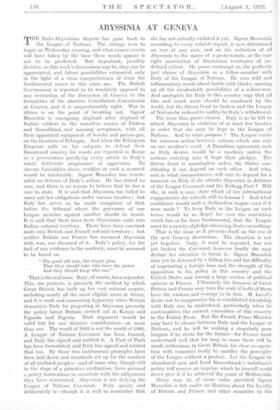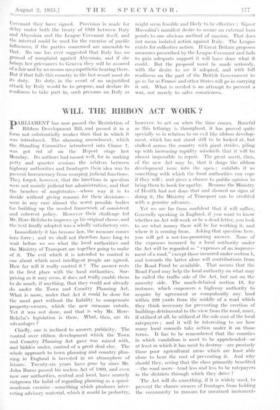ABYSSINIA AT GENEVA
THE Italo-Abyssinian dispute has gone back to the League of Nations. The sittings were to begin on Wednesday evening, and what course events will have taken by the time these words appear is not to be predicted. But important, possibly decisive, as this week's discussions may be, they can be appreciated, and future possibilities estimated, only in the light of a clear comprehension of what the fundamental issues in this crisis are. The British Government is reported to be resolutely opposed to any restriction of the discussion at Geneva to the formalities of the abortive Conciliation Commission at Geneva, and it is unquestionably right. War in Africa is on the point of breaking out. Signor Mussolini is consigning shipload after shipload of Italian soldiers to the waterless wastes of Eritrea and Sonialiland, and massing aeroplanes, with all their .appointed equipment of bombs and poison-gas, on the frontiers of Ethiopia. And when the Ethiopian Emperor calls on his subjects to defend their threatened country his words are regarded in Horne as a provocation justifying every article in Italy's whole deliberate programme of aggression. To elevate fOrmalities above realities at such a moment would be intolerable. Signor Mussolini has vouch- safed no defence of Italy's action. He has stated no case, and there is no reason to believe that he has a case to state. It is said that Abyssinia has failed to carry out her obligations under various treaties ; but Italy has never so far made complaint of that before the tribunal where the grievance of one League member against another should be heard. It is said that there haVe been Abyssinian raids into Italian colonial territory. There have been constant raids into British and French colonial territory ; but neither Britain nor France has menaced Abyssinia with war, nor dreamed of it. Italy's policy, for the lack of any evidence to the contrary, must be assumed to be based on " The good old rule, the simple plan That they should take who have the poWer • And they should keep who can." , That is the real issue. Italy, of course, has a rejoinder, This, she protests, is pfecisely the method by which Great Britain has built up her vast colonial empire, including nearly all the most eligible areas in Africa, and it is rank and nauseating hypocrisy when Britain denounces Italy. for projecting in Abyssinia precisely, the policy Great Britain carried out in Kenya and Uganda and Nigeria, That argument - would be valid but for one decisive consideration—or more than one. The world of 1935 is not the world of 1905: A League of Nations Covenant has been framed, and Italy has signed and ratified it A Pact of PariS has been formulated, and Italy has signed and ratified that too. By those two instruments principles have been laid down and standards set up for the, conduct of all civilized peoples—and of some who, though still in the stage of a primitiVe civilization, have pursued a policy harmonious in essentials with the obligations they have contracted. Abyssinia is not defying the League of Nations Covenant. Italy openly and deliberately is—though it is well to remember that she has not actually violated it yet. Signor, Mussolini, according to every reliable report, is now determined on war at any cost, and on . the reduction of all Abyssinia to the status of a protectorate, or the out- right annexation of Abyssinian territories of in- defined extent. He pours contempt on the perfectly just claims of Abyssinia as a fellow-member : with Italy of the League of Nations. He uses wild and inflammatory words about battle with blacks, opening up all the incalculable possibilities of a colour-war.. And apologists for Italy in this country urge that all this and much more should be condoned by the world, lest the Stresa front be broken and the League of Nations be reduced to nullity by Italy's withdrawal.
The issue thus grows clearer. Italy is to be left to attack Abyssinia in violation' of at least five treaties in order that she may be kept in the League of Nations. And to what purpose ? The League exists for common action between nations which can rely on one another's word. A Danubian agreement such as Italy desires would be a mockery unless the nations entering into it •kept their pledges. The Stresa front is meaningless unless the States con- stituting it can depend on each other. And who, and in what circumstances, will care to depend for a moment on Italy if she attacks Abyssinia in defiance of the League Covenant and the Kellogg Pact,? Will she, in such a case, state which of her international engagements she intends still to honour ? And what confidence would such a declaration inspire even if it were Made ? To keep Italy in the League on such terms would be to dispel for ever the conviction which has so far been fundamental, that the League must be a society of pledge-observing States or nothing.
That is the issue as it presents itself on the eve of the • new Geneva discussions. The situation is not yet hopeless. Italy,. it must be repeated, has not yet broken the Covenant, however loudly she .may declare her intention to break it. Signor Mussolini may yet be deterred by a falling lira and the difficulty of negotiating a foreign loan and the strength of the opposition to his policy in this country and the United States and among a large section Of political Ultimately the firmness of Great. opinion in France, Britain and France may turn the scale if both of them have the wisdom and courage to be firm. M. Laval's desire not to compromise his re-established friendshiP with Italy can be understood, particularly when he contemplates the current execration of this country in the Italian Press. But the French Prime Minister may have to choose between Italy and the League of Nations, and he will be making a singularly poor bargain if he elects for the former—for France must understand well that for lOng to come there will be small enthusiaSm in Great Britain for close co;•opera• tion with countries ready to 'sacrifice the principles of the League without a protest. Let the League be abandoned now and Lord Beaverbrook's isolationist policy will receive an impetus which he himself could never give it if he achieved the years of Methuselah.
Delay may be of Softie' value provided Signor Mussolini is left under no illusions about the loyalty of Britain and France and Other • countries to the
Covenant they have signed. Provision is made for delay under both the treaty of 1928 between Italy and Abyssinia and the League Covenant itself, and the interval could be used for the exercise of pacific influences, if the parties concerned are amenable to that No one has ever suggested that Italy has no ground of complaint against Abyssinia, and if she brings her grievances to Geneva 'they will be assured of a' fair and by no means unsympathetic hearing there. But 'if that fails this country in the last resort must do its duty. Its duty, in the event of an unjustified attack by Italy would be to- propose, and declare its readiness to take part in4 such pressure on Italy as might seem feasible and likely to be effective ; Signor
manifest desire to secure an external loan points to one obvious method of suasion. That does hot mean isolated action against Italy. The League exists for collectivnaction. If Great Britain proposes measures prescribed by the League Covenant and fails to gain adequate support it will have done what it could. But the Proposal nne4t lie made seriously, with the desire to See, it adopted, and with full readiness on the part Of the British Government to go as far as France and other States will go in carrying it out. What is needed is an attempt to prevent a War, not merely to salve consciences.







































 Previous page
Previous page